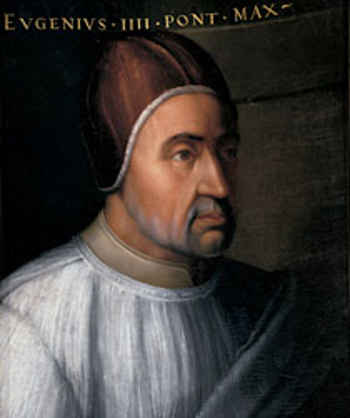The world-unifying Council of Basel had been convened in Switzerland in 1431 by Martin V to continue the reforms under his papacy that had solved the Western Schism, which had torn apart Catholic Christendom for nearly forty years. In 1417, the Council of Constance had determined agreements to have the Roman Pope Gregory XII and Pisan Pope John XXIII, while the Avignon Pope Benedict XIII was excommunicated, undercutting his support and effectively ending the schism. Conciliarism had solved the issues of whom to trust with ultimate authority and many sought for it to reign supreme in Western Europe.
Councils were to take place every seven years, and Martin V convoked Basel shortly before his death of apoplexy. His cunning assistant Gabriele Condulmer was appointed Pope Eugene IV quickly afterward, and he immediately began to struggle with the Council. In December, Eugene called a dissolution for the Council, but the electors refused to leave and continued reforms. Eugene, a native Venetian, gave papal support to his city and allied Florence against Milan during the Lombardy Wars, which spawned great unrest among the Romans. After two years of contrary bulls, the two were reconciled by the newly elected Holy Roman Emperor Sigismund, who allowed for the retaining of papal powers (and protection) while Eugene IV revoked the dissolution.
Following his settlement with those at Basel and looking toward presiding over a peace treaty in Ferrara, Eugene attempted to escape Rome disguised as a Benedictine monk. While in the Tiber, he was spotted and had stones thrown at him until a band of Romans supporting the Colonnna Family swam into the river and dragged him back to the Vatican. The city turned to an uproar that even the papal armies under Cardinal Vitelleschi could not reestablish control with the Pope under hostage. The peace talks in Ferrara disintegrated without the pope, and his influence began to become questioned as balance struck itself out.
While the Pope's power waned, the Council at Basel continued to grow in prestige. They wrote reform (such as banning circumcision as a mortal sin), judged lawsuits, acted as mediators, and even influenced the Treaty of Arras ending the Hundred Years' War between France and England. As the Council worked to achieve union with the church in the East, Eugene IV finally had to give them recognition to align his own political agendas. The parties worked to determine a place of meeting with the Council wanting an inland city far from Roman influence and the Greeks of Constantinople hoping for an easily reached port city. On January 10, 1438, the convention met, and the two churches began discussing ways of reconciling their dogma. Eugene worked to gain advantage in the discussion, but on January 24, the Council suspended him. It was the first step on the downward spiral of papal power, followed soon after of gaining the support of Frederick III, King of the Romans, that would eventually be relocated to a main seat representing overall Western Catholicism on the Council.
In the meantime, the Council was able to achieve an agreement with Patriarch Joseph II of Constantinople early in 1439. He would die that June, but by then the union would be in action, and, though unpopular, would prove to be mutually beneficial as the West ended its infighting and launched fresh crusades to beat back the Ottoman advances on the East. The reunification of the Church continued as the Coptic Christians arrived from Ethiopia with delegates in 1441. Further unification came as the Jacobites of Syria, Maronites of Lebanon, and even Nestorians of Persia came into the fold, joining Armenians and Russians who had already come. They managed to incite rebellion through the growing Ottoman Empire in Greece and Turkey, ending the expansion of Muslim political power while eclipsing it with a new Christian coalition.
The strong unity came as the Council debated issues such as purgatory and the Processions of the Holy Spirit. Theological debates will continue eternally, but the loose Constitution of Christendom would define a common ground that would be used by political leaders throughout Europe, Asia, and Africa to determine trade agreements, terms of war and peace, and overall morality. Missionaries and conquerors would stretch the reach of Christendom through Africa (in a crusade against slavery once dreamed by Martin V), Mongol-controlled Asia, and even to the newly discovered Americas.
Noted Pope Martin VI, formerly Augustinian monk Martin Luther, would lead internal matters of reformation by separating Church and State, the holy and the secular, solving many of the issues rising by the very different beliefs of the many churches that could not be rectified with his famous bull, “...Therefore I declare that neither pope nor bishop nor any other person has the right to impose a syllable of law upon a Christian man without his own consent.”
–
In reality, Eugene IV escaped Rome in 1433. War paused in northern Italy, and he maintained significant political influence. When the Council of Basel, moved to Ferrara and then Florence, attempted to suspend and depose Eugene while electing their own antipope. The schism would last ten years, and the political disagreements would break down attempts of unifying the world's Christian churches while establishing papal authority over councils.

No comments:
Post a Comment